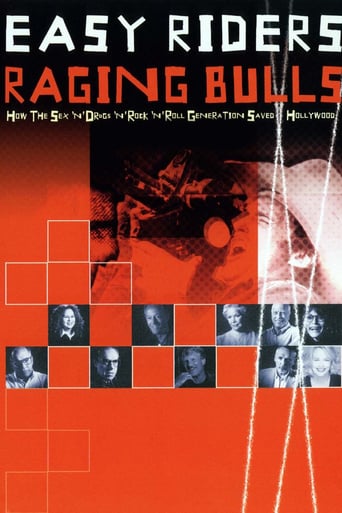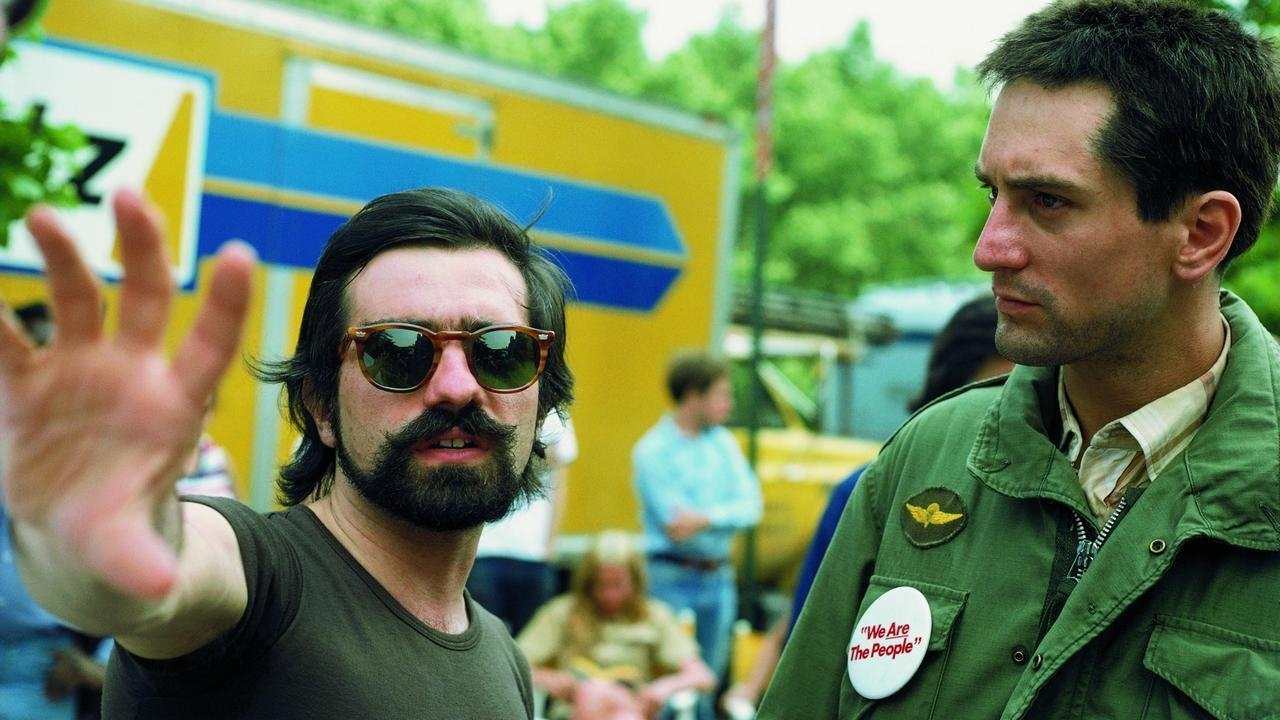Dhawal Trivedi
revolution of films from the mid'60s-late'70s... in the mid 60's, during the peak of European cinema (with directors like- Bergman, Fellini, Godard, Truffaut) Hollywood was on a downhill loosing its artistic touch. big studios wanted to make same old movies and film audiences wanted more realistic cinema.. after redemption of old studios, then came a new wave of young filmmakers who defined the Hollywood now. martin Scorsese, Francis ford Coppola, Steven Spielberg, peter Bogdanovich, Hal Ashby, Dennis hopper, warren Beatty, were practically just movie-nerds who wanted to talk about films all day and make them... and of course sex,drugs, rock n roll culture played a big part in this evolution too. movies like bonnie and Clyde, easy rider, the godfather, taxi driver, mean streets.its a great documentary about, how few trend setting directors took control of film/Hollywood from studio-centralized oriented films, in their own hands. also early days of jack Nicholson and Robert De niro. but once in 70's, these directors made blockbusters like godfather, jaws, star wars... studios figured out the way to make big money and now its all about just "big-budget-B-grade movies"filmmakers in 60's were- you don't know how to make a film, i do, so let me do it ! and finally after 10 years studios were able to say- yes we do know how to make money, and u will make it for us !
Michael_Elliott
Easy Riders, Raging Bulls (2003) **** (out of 4) I've often been criticized for overly bashing movies made the past twenty years but perhaps deep down I'm just wishing for a return to the 1970's, which was following a decade for a horrid studio films that were being made for millions, yet couldn't find an audience. The studios were one by one pretty much shutting down yet on the outside there was an up and coming ground that was ready to rebuild Hollywood with their sex, drugs and rock and roll.Easy Riders, Raging Bulls starts off showing the decline of the 1960's yet quickly flashes to the one success story that is B-Movie legend Roger Corman who turned out low budget films that brought back millions by going the drive-in route and causing the teens to line up at the doors. While Corman wasn't the greatest director, he certainly knew how to spot talent and by this he helped discover talents such as Martin Scorsese, Jack Nicholson, Dennis Hopper, Francis Ford Coppola, Peter Borgdanovich and many others.The defined genre in Hollywood started with Easy Rider, which was a low budget film that was made my stoned hippies yet it hit a nerve with people and became a huge hit. Although there had been many biker films produced before this one, this film had sex and drugs, which was speaking to a new generation and soon these young talents were going to Hollywood wanting to make their own films. Hollywood had burned itself for over a decade so they slowly started to listen to these teens who in return were making modern classics. Films such as Midnight Cowboy, Targets, Chinatown, Five Easy Pieces and Mean Streets are just a few titles that this crowd brought in.However, this new crowd also brought a lot of drugs to Hollywood and their ultra-egos slowly started to destroy their lives. The documentary talks about the wild parties, the sex and how this had an impact on the director's careers. Once considered something great they were slowly dying on their own success. Towards the end of the documentary the film flashes back to Corman who pretty much saw the end of this period when Jaws was released. In Corman's own words, the studios finally realized how he was making so much money. Corman was simply making B movies that would attract all sorts of teens. The studios then started to deliver the summer blockbuster with films like Jaws and Star Wars, which were nothing more than B movies with a budget. In 1980, Scorsese fought back with Raging Bull, which was the last "director's" film to come out of Hollywood.Easy Riders, Raging Bulls is a candid, revealing and downright fascinating look at the greatest era in Hollywood where the studios were the small guys and the small guys, the directors, were running things and turning some very small movies into films that are now looked at as classics. The documentary does a brilliant job at showing what type of crowd these guys were with interesting interviews with the likes of Peter Bark, Peter Bogdanovich, Ellen Burstyn, Richard Dreyfuss, Peter Fonda, Dennis Hopper, Cybil Shepherd, Laszlo Kovacs and many more. These people tell stories from behind the scenes of the production of these movies as well as stories of all the sex and drugs going across the town.Considering the horrid movies that are being made today, one can only wish this period of Hollywood would return. Watching the film it makes it seem so clear at what it took to make these classics. It wasn't a budget or a star but a director who had the courage to be daring and not worry about pleasing the audience. Instead of playing to the crowd these director's played the crowd. There's some wonderful home movie footage of the Easy Rider hippies taking over Cannes plus wonderful stories about Alfred Hitchcock's AFI Lifetime Achievement Award where most of the young crowd was in the bathroom snorting coke while the legendary director was speaking.Easy Riders, Raging Bull at most is very entertaining but I'm sure many new viewers will also find this to be an incredibly learning experience. Being only 23 years old, I know many my age who simply don't "get" older films yet I'm sure after watching this they would see how much daring films used to be before the likes of Spielberg and Lucas turned them into a cash cow. The film talks very openly about the good old days and they also talk candidly about why they ended. Those interviewed give a wonderful vision of those days and director Kenneth Bowser has a terrific time telling these stories. The worst thing about the movie is that it just runs two hours because this is the type of entertainment that could have gone on for fifty-hours and not once become boring. Anyone interested in the 1970's filmmaking or want to learn about it should certainly check this out.
moonspinner55
After 20th Century-Fox's "The Sound of Music" raked in big box-office and Academy Awards, every Hollywood studio was busy for the next couple of years trying to duplicate its success (it isn't specified here, but Fox itself was one of the hungriest at pilfering from this genre). Unfortunately, "The Sound of Music" was really the end of the popular, old-fashioned, break-out-in-song Hollywood movie, giving way to the rebellious counterculture. Seen as a major turning point--and released before "Bonnie & Clyde"--"The Wild Angels", a Roger Corman biker flick from A.I.P. (which came out one year after "The Sound of Music"), signaled a change in perceptions. The studio system was breaking down and actors were no longer on contract (since the youth movement didn't exactly want pretty stars). Most young, hungry American movie makers of this period took their cues from the European directors of the early '60s, and this documentary chronicles their battles with the ever-present Hollywood regime into getting their avant garde movies made, marketed and released. Most of the movers and shakers from the past are here, looking quite good, and their recollections from this fertile period for thought-provoking entertainment are fascinating. The downfalls (the drugs, the egos) are documented in a matter-of-fact way, nobody is chastised or condescended to, as the rise of the summer blockbuster (Steven Spielberg's "Jaws") heralded the weakening of the character-driven drama. This film does make it seem as if the smaller, more personal Hollywood motion picture is completely dead now, but fails to take into consideration terrific films like "Sling Blade" or "Monster's Ball" which, high profile or not, give serious movie-fans hope for the future. But as a chronicle of this golden era, "Easy Riders, Raging Bulls", narrated by William H. Macy, is fairly straightforward, mostly accurate, very entertaining, and a great tool for film buffs who weren't privileged to have been there. *** from ****
jerk1483
This docu makes the misguided error of comparing the careers of Hal Ashby and Steven Spielberg. More different film-makers there have never been. However, by sheer virtue of sharing artistic or commercial success in Hollywood in the same decade, these two anomylous inclusions are lumped in together. Peter Bogdanovich regales us simpletons with his self-encyclopedia, as if he were ever more than a journey-man director. It's intriguing to see the commercial success of The Exorcist and the critical success of Mean Streets sharing the same five minute discussion with various Hollywood talking heads all of whom are past their prime.One of the rare gems of the film is the sequence recalling how Martin Scorcese, Paul Schrader, George Lucas, Spielberg and many other prominent male film-makers would hang out in the same beach houses in Malibu, but it's only ten minutes long. This is a film obsessed with the tangential perks of that divine spark that was the 70's renaissance of American movies. Presumably this film is based on a best-selling book of the same name, but all this film can sum up is that a bunch of cool movies came out in the 70's, and that, YES, the men who made those movies hung out from time to time. Honestly, you'd be better off just watching every film by the directors that this film interviews and save yourself the thankless task of listening to too many Hollywood has-beens pine for yesteryear. What really happened to these people's careers? Drugs for some, ego for others. Spotty at best, this film just isn't all it could be. 3/10


 AD
AD



